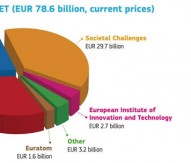

© European Union, 2013
A Finnish horizon
Finland is one of Europe’s leading innovators. The Scandinavian state’s record is impressive: it ranks number one for R&D intensity in the EU, placed fourth in the European Commission’s 2013 Innovation Union Scoreboard position, and secured an application success rate of 21.6% in FP7, higher than the EU average.
Finland is the second EU member state to officially launch Horizon 2020. The event took place at Finlandia Hall in the capital Helsinki and was organised by the Ministry for Employment and the Economy and EUTI (EU Research and Innovation Programmes), the co-ordinator of the Finnish National Contact Point system. Making the keynote speech, Máire Geoghegan-Quinn, European Commissioner for Research, Innovation and Science, began by highlighting the Finland’s leading knowledge economy and the positive impact this has had on economic growth.
“You are thought leaders when it comes to research and innovation. Indeed, for many years Finland has been the ‘poster child’ for using R&D and innovation as an economic stimulus. Your recipe for reversing economic stagnation in the 1990s by pumping investment into research and innovation has since served as an example for many other countries.
“You are still in first place in the EU in terms of public investment in research, though this is declining slightly, and number one in terms of business R&D intensity. The number of researchers as a percentage of the population is more than double the EU average.
“In terms of scientific quality, Finnish research excels in many fields, including ICT; food agriculture and biotechnology; health; the environment, energy and security. Finland has a very strong research and innovation performance overall – you have a very skilled workforce, high levels of both public and private investment in R&D, and a high rate of patent applications.”
Finnish innovation
Geoghegan-Quinn continued by highlighting the importance of continuing to invest in the next generation of innovation enterprises to stay ahead of competition and recognised the progress the Finnish Government was making.
“Although Finland is an innovation leader, showing an above-EU average innovation performance, its capacity to generate high-growth innovative enterprises, that replace older firms, is weaker than many other member states.
“In 2012, and again in 2013, as part of the European Semester exercise, the Council of the European Union issued a country-specific recommendation to Finland to continue its efforts to diversify its business structure and boost its capacity to deliver innovative products and services in a rapidly changing environment. I know that the Finnish Government is taking steps to address these challenges and Horizon 2020 can help too.”
Finland is a pioneer of some of the most technologically-advanced companies in the world, being the home of Nokia, Rovio, Iittala and Marimekko. However, innovation is not just restricted to the private sector, as the Commissioner highlighted.
“You will also see the influence of Finland’s approach to innovation in some of the new elements of Horizon 2020. Besides its expertise in technology-related R&D, Finland is also a leader in the most innovative aspects of innovation. I’m thinking here of social innovation, open innovation and public sector innovation. You don’t just talk about these things, you get them done. Horizon 2020 will support the best projects in all these areas.
“I very much enjoyed visiting the Otaniemi Research and Innovation Hub yesterday where I saw Finnish Open Innovation in action. Otaniemi is a good example of knowledge circulation by bringing together both domestic and foreign innovation knowhow in the form of researchers, academics and businesses.”
Innovation chain
The next framework programme focuses on covering the entire value chain in the development of new products, helping businesses, entrepreneurs and researchers to cross the ‘valley of death.’ With an additional focus on simplification and coherency, it is hoped there will be more opportunities for private companies to become involved in close-to-market actions.
“Horizon 2020 covers every link in the value creation chain from fundamental research through to market innovation in one single programme. While the strong focus on excellent research remains, there is also a new emphasis on support to accelerate the market uptake of innovation.
“More money will be available for testing, prototyping, demonstration and pilot type activities, for business-driven R&D, for promoting entrepreneurship and risk-taking, and for shaping demand for innovative products and services.”
SMEs
Horizon 2020 is also boosting its support for small businesses and it is hoped the introduction of an SME instrument, in addition to two specialised financing facilities, will encourage greater participation, as the Commissioner outlined.
“While all sizes and types of business can benefit from Horizon 2020, we’re putting the spotlight on innovative SMEs that want to both develop nationally and spread their wings internationally. Research and innovation for SMEs are promoted across Horizon 2020 as a whole, but we are also introducing a new instrument that is adapted to their specific needs. This will allow single SMEs to receive small, simple grants for highly innovative projects.
“The new dedicated SME instrument will fill gaps in funding for early-stage, high-risk research and innovation by SMEs and help stimulate breakthrough innovations.”
From FP7 to Horizon 2020
As FP7 draws to a close, Geoghegan-Quinn highlighted the key sectors contributing to Finland’s R&D successes and called on the country to continue investing and reap the major benefits Horizon 2020 can bring.
“Under the current 7th Framework Programme, Finnish participants have so far drawn down €690m of funding. They have been most successful in the areas of ICT; health; nanosciences, materials and new production technologies; food, agriculture fisheries and biotechnology, and energy. Capitalise on this and build on your S&T potential in these areas, while striving to maximise opportunities in new areas of research and innovation.
“In the long run, creating an efficient, outward-looking and dynamic research and innovation system will ensure the economy is based on a solid, long-lasting foundation. We want this for every country in Europe. Horizon 2020 can provide the spark.”





